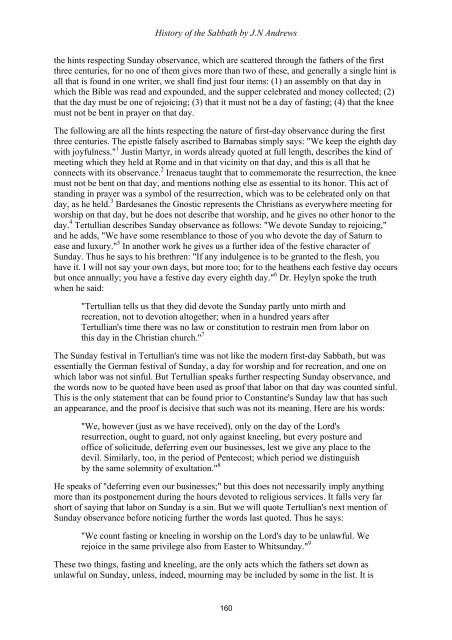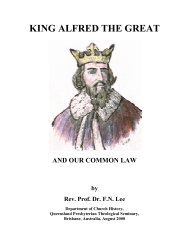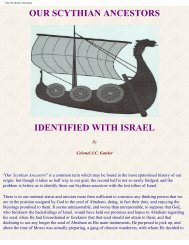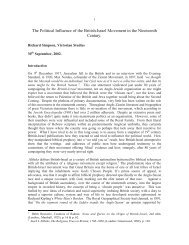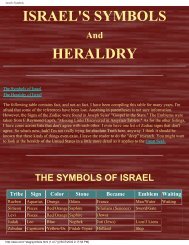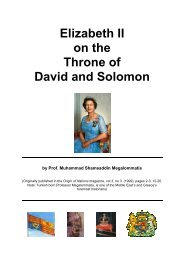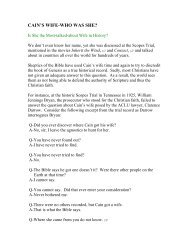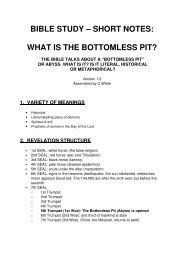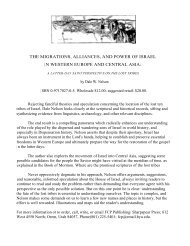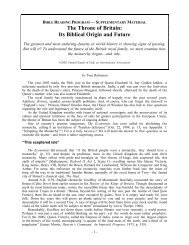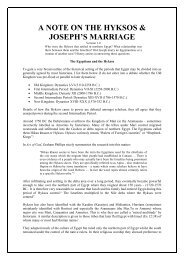HISTORY OF THE SABBATH - Friends of the Sabbath Australia
HISTORY OF THE SABBATH - Friends of the Sabbath Australia
HISTORY OF THE SABBATH - Friends of the Sabbath Australia
Create successful ePaper yourself
Turn your PDF publications into a flip-book with our unique Google optimized e-Paper software.
History <strong>of</strong> <strong>the</strong> <strong>Sabbath</strong> by J.N Andrews<strong>the</strong> hints respecting Sunday observance, which are scattered through <strong>the</strong> fa<strong>the</strong>rs <strong>of</strong> <strong>the</strong> firstthree centuries, for no one <strong>of</strong> <strong>the</strong>m gives more than two <strong>of</strong> <strong>the</strong>se, and generally a single hint isall that is found in one writer, we shall find just four items: (1) an assembly on that day inwhich <strong>the</strong> Bible was read and expounded, and <strong>the</strong> supper celebrated and money collected; (2)that <strong>the</strong> day must be one <strong>of</strong> rejoicing; (3) that it must not be a day <strong>of</strong> fasting; (4) that <strong>the</strong> kneemust not be bent in prayer on that day.The following are all <strong>the</strong> hints respecting <strong>the</strong> nature <strong>of</strong> first-day observance during <strong>the</strong> firstthree centuries. The epistle falsely ascribed to Barnabas simply says: "We keep <strong>the</strong> eighth daywith joyfulness." 1 Justin Martyr, in words already quoted at full length, describes <strong>the</strong> kind <strong>of</strong>meeting which <strong>the</strong>y held at Rome and in that vicinity on that day, and this is all that heconnects with its observance. 2 Irenaeus taught that to commemorate <strong>the</strong> resurrection, <strong>the</strong> kneemust not be bent on that day, and mentions nothing else as essential to its honor. This act <strong>of</strong>standing in prayer was a symbol <strong>of</strong> <strong>the</strong> resurrection, which was to be celebrated only on thatday, as he held. 3 Bardesanes <strong>the</strong> Gnostic represents <strong>the</strong> Christians as everywhere meeting forworship on that day, but he does not describe that worship, and he gives no o<strong>the</strong>r honor to <strong>the</strong>day. 4 Tertullian describes Sunday observance as follows: "We devote Sunday to rejoicing,"and he adds, "We have some resemblance to those <strong>of</strong> you who devote <strong>the</strong> day <strong>of</strong> Saturn toease and luxury." 5 In ano<strong>the</strong>r work he gives us a fur<strong>the</strong>r idea <strong>of</strong> <strong>the</strong> festive character <strong>of</strong>Sunday. Thus he says to his brethren: "If any indulgence is to be granted to <strong>the</strong> flesh, youhave it. I will not say your own days, but more too; for to <strong>the</strong> hea<strong>the</strong>ns each festive day occursbut once annually; you have a festive day every eighth day." 6 Dr. Heylyn spoke <strong>the</strong> truthwhen he said:"Tertullian tells us that <strong>the</strong>y did devote <strong>the</strong> Sunday partly unto mirth andrecreation, not to devotion altoge<strong>the</strong>r; when in a hundred years afterTertullian's time <strong>the</strong>re was no law or constitution to restrain men from labor onthis day in <strong>the</strong> Christian church." 7The Sunday festival in Tertullian's time was not like <strong>the</strong> modern first-day <strong>Sabbath</strong>, but wasessentially <strong>the</strong> German festival <strong>of</strong> Sunday, a day for worship and for recreation, and one onwhich labor was not sinful. But Tertullian speaks fur<strong>the</strong>r respecting Sunday observance, and<strong>the</strong> words now to be quoted have been used as pro<strong>of</strong> that labor on that day was counted sinful.This is <strong>the</strong> only statement that can be found prior to Constantine's Sunday law that has suchan appearance, and <strong>the</strong> pro<strong>of</strong> is decisive that such was not its meaning. Here are his words:"We, however (just as we have received), only on <strong>the</strong> day <strong>of</strong> <strong>the</strong> Lord'sresurrection, ought to guard, not only against kneeling, but every posture and<strong>of</strong>fice <strong>of</strong> solicitude, deferring even our businesses, lest we give any place to <strong>the</strong>devil. Similarly, too, in <strong>the</strong> period <strong>of</strong> Pentecost; which period we distinguishby <strong>the</strong> same solemnity <strong>of</strong> exultation." 8He speaks <strong>of</strong> "deferring even our businesses;" but this does not necessarily imply anythingmore than its postponement during <strong>the</strong> hours devoted to religious services. It falls very farshort <strong>of</strong> saying that labor on Sunday is a sin. But we will quote Tertullian's next mention <strong>of</strong>Sunday observance before noticing fur<strong>the</strong>r <strong>the</strong> words last quoted. Thus he says:"We count fasting or kneeling in worship on <strong>the</strong> Lord's day to be unlawful. Werejoice in <strong>the</strong> same privilege also from Easter to Whitsunday." 9These two things, fasting and kneeling, are <strong>the</strong> only acts which <strong>the</strong> fa<strong>the</strong>rs set down asunlawful on Sunday, unless, indeed, mourning may be included by some in <strong>the</strong> list. It is160


